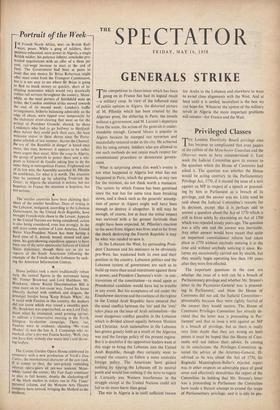GENERALS STRIKE
THE competition in chauvinism which has been going on in France has had its logical result —a military coup. In view of the inflamed state of public opinion in Algiers, the distorted picture of M. Pflimlin which has been created by the Algerian press, the dithering in Paris, the month without a government, and M. Lacoste's departure from the scene, the action of the generals is under- standable enough. General Massu is popular in Algiers because he stamped out terrorism and successfully restored order in the city. He achieved this by using torture. Soldiers who are allowed•to use such methods do not retain much respect for constitutional procedure or democratic govern- ment.
What is surprising about this week's events is not what happened in Algeria but what has not happened in Paris, which the generals, at any rate for the moment, do not think worth a massacre. The system by which France has been governed since the war has for some time been breaking down, and a shock such as the generals' assump- tion of power in Algiers might well have been enough to destroy it altogether. It still may be enough, of course, but at least the initial impact was survived with a far greater fortitude than might have been expected. M. Pflimlin's reaction to the news from Algiers was firm, and so far from the shock destroying the Fourth Republic it may be what was needed to save it.
In the Lebanon the West, by persuading Presi- dent Chamoun and his ministers to be obviously pro-West, has weakened both its own and their position in the country. Lebanese politics and the Lebanese system of government are such as to build up more than usual resentment against those' in power, and President Chamoun's wish—in con- travention of the constitution—to stand again as Presidential candidate would have led to trouble in any event. But his acceptance of aid under the Eisenhower doctrine and the coolness of the regime to the United Arab Republic have ensured that the usual conflict between the 'ins' and the 'outs' takes place on the issue of Arab nationalism—the most dangerous conflict possible in the Lebanon which is divided almost equally between Moslem and Christian. Arab nationalism in the Lebanon has grown greatly both as a result of the Algerian war and the foreign policy of the present regime. But it is doubtful if the opposition leaders want at this stage to bring the Lebanon into the United Arab Republic, though they certainly want to compel the country to follow a more neutralist foreign policy. The Americans have gained nothing by tipping the Lebanon off its neutral ' perch and would lose nothing if she were to regain it. Certainly any Western interference in the struggle except at the United Nations could not fail to do more harm than good.
The war in Algeria is in itself sufficient reason for Arabs in the Lebanon and elsewhere to want to avoid close alignments with the West. And at least until it is settled, neutralism is the best we can hope for. Whatever the upshot of the military revolt in Algeria the more important problems will remain—for France and the West.


































 Previous page
Previous page